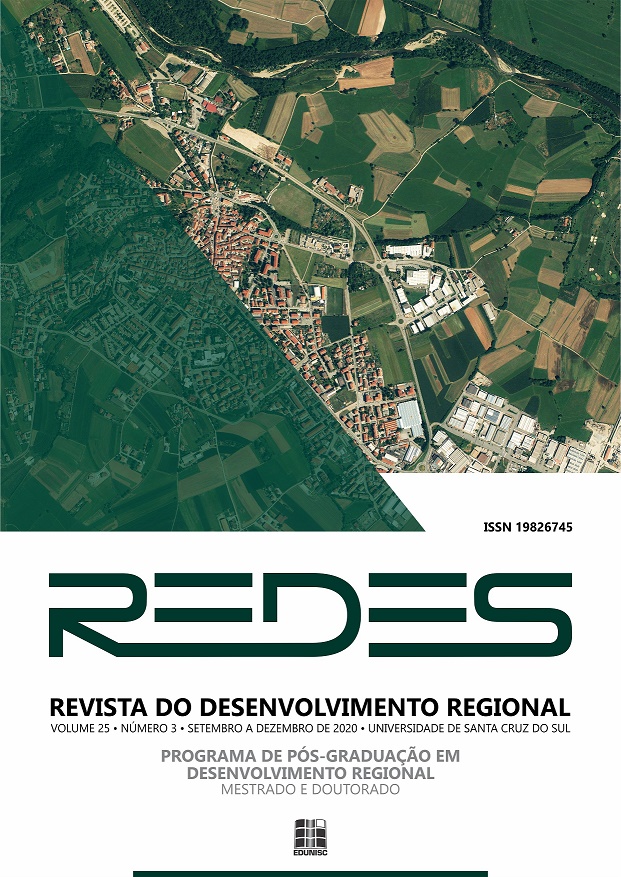Beyond the approach of territorial governance of spatial planning projects through participation. The example of France
DOI:
https://doi.org/10.17058/redes.v25i3.15537Keywords:
Territorial Governance. France. Spatial planning. Conflicts. Territory. Public participation.Abstract
Starting from the observation of the seriousness of the situation posed by spatial planning conflicts seen in France, this article develops a reflection on the apparent paradox of territorial governance in this country. Breaking with decades of centralism and omnipotent State, France has developed territorial reforms and consultation bodies in order to improve the adjustment between functional territories and institutional territories but without managing to improve relations between political actors and civil society.Downloads
References
ALLMENDINGER, Ph. Planning Theory. London: Palgrave Macmillan, 2009.
BEHAR .D , ESTEBE.P, VANIER.M, Réforme territoriale: avis de décès de l’interterritorialité? Métropolitiques, juin 2014. Available in : http://www.metropolitiques.eu/Reforme-territoriale-avis-de-deces.html Accessed on: May 13. 2019
BLONDIAUX, L.; FOURNIAU, J.-M. Un bilan des recherches sur la participation du public en démocratie : beaucoup de bruit pour rien ? Participations, v. 1, n. 1, p. 10-35, 2011.
BRETON, Ph.; GISSINGER, C. Les conseils de quartier, un révélateur des difficultés d’émergence du nouveau « pouvoir consultatif ». Communication et organisation, n. 35, p. 124-135, 2009.
BRUNET, R.; FERRAS R.; THERY H. Les mots de la géographie, dictionnaire critique. Paris, Montpellier: Reclus, La Documentation française, 1993.
BUTTIMER, A. Reason, rationnality and human creativity. Geografiska Annaler, v. 61, n. 1, p. 43-49, 1979.
CARREL, M. La gouvernance est-elle démocratique ? Les enjeux de la participation citoyenne. Informations sociales, v. 179, n. 5, p. 144-151, 2013.
CASSILLO, I.; ROUSSEAU, D. Démocratie participative et quartiers prioritaires : réinvestir l’ambition politique des conseils citoyens. In: Commission nationale du débat public, [S.d.]. Available in: www.debatpublic.fr. Accessed on: May 13. 2019
COASE, R.H. The problem of social cost. Journal of Law and Economics, v. 2, n. 3, p. 1-44, 1960.
CRENSHAW, K. W. Demarginalizing the Intersection of Race and Sex: A Black Feminist Critique of Anti-discrimination Doctrine, Feminist Theory and Antiracist Politics ». University of Chicago Legal Forum, p. 139-167, 1989.
DUBET, F. Le temps des passions tristes. Paris: Le Seuil, 2019.
DUROS, M. La variable sexe suffit-elle pour comprendre les inégalités de genre ? : L'apport de L'intersectionnalité, Regards croisés sur l'économie. Paris: La Découverte, v. 2, n. 15, p. 80-84, 2014.
ENTRIKIN, J. N. The betweeness of place. Towards a geography of Modernity. Baltimore: The John Hopkins University Press, 1991.
FOUCAULT, M. « Le jeu de Michel Foucault » (entretien avec D. Colas, A. Grosrichard. G. Le Gaufrey, J. Livi, J. Miller, J.-A. Miller, C. Millot, G. Wajeman), Ornicar ? Bulletin périodique du champ freudien, 10, pp. 62-93, 1977.
FRÉMONT, A. La région, espace vécu. Paris: Presses Universitaires de France, 1976.
GAÏTI, B.; JOBERT, A.; VALLUY, J. Définir l'intérêt général. Politix, v. 11, n. 42, 1998
HARTOG, F. Régimes d’historicité, présentisme et expérience du temps. Paris: Le Seuil, 2003
JAUNAIT, A.; CHAUVIN, S. Représenter l’intersection: les théories de l’intersectionnalité à l’épreuve des sciences sociales. Revue Française de Science Politique, v. 62, n. 1, 2012.
JOBERT, A. L'aménagement en politique. Ou ce que le syndrome NIMBY nous dit de l'intérêt général. Politix, v. 11, n. 42 p. 67-92, 1998.
LABUSSIÈRE, O. Les stratégies esthétiques dans la contestation des projets d'aménagement: le milieu géographique entre singularité et exception. L’Information Géographique, v. 73, n. 2, p. 68-88, 2009.
LAGROYE, J. ; OFFERLE, M. Sociologie de l’institution, Paris, éditions Belin, 2010.
RANCIÈRE, J. La mésentente. Politique et philosophie. Paris: Galilée, 1995.
SANTAMARIA, F.; ELLISSALDE, B., Territory as a Way to Move on from the Aporia of Soft/Hard Space. Town Planning Review, v. 89, n. 1, p. 43-60, 2018.
STEIN M. S.; HARPER TH. L. Creativity and Innovation : Divergence and Convergence in Pragmatic Dialogical Planning. Journal of Planning Education and Research, v. 32, n. 5, p. 5-17, 2012.
SUBRA, P. De Notre-Dame-Des-Landes à Bure, la folle décennie des « Zones À Défendre » (2008-2017), Hérodote, v. 2, n. 165, p. 11-30, 2017.
SUBRA, Ph. Géopolitique de l’aménagement du territoire. Seconde édition. Paris: Armand Colin, 2014
TAGUIEFF, P.-A. L’Effacement de l’avenir. Paris: Galilée, 2000
TORRE, A.; RALLET, A.Proximity and localization. Regional Studies, vol. 39, n.1, 47-60, 2005.
VANIER, M. L’interterritorialité: des pistes pour hâter l’émancipation spatiale. In: ANTHEAUME, B. ; GIRAUT, F. Le territoire est mort, vive les territoires. IRD Editions, pp.317-336, 2005.



